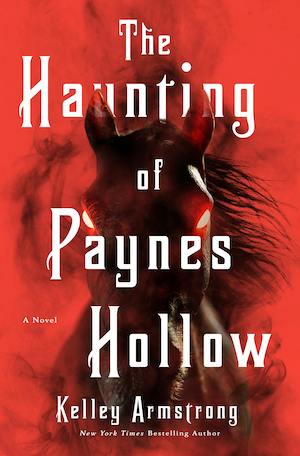
The Haunting of Paynes Hollow
While an undergrad at UCLA many years ago, I took a class on review writing in the arts. One of the guest lecturers wrote book reviews for the Los Angeles Times. He confessed that being a book critic led to certain prejudices. He had grown tired of specific types of novels, and passed on reading them. Although he named three “subgenres” that he refused to review, I only remember two: novels set in Florida, and narratives that featured talking animals. This may seem rather eccentric but now, after years of being a book critic myself, I do understand. And it is best to acknowledge prejudices and biases. When reviewing a novel by a well-known author, I expect more. Those established writers have a built-in readership and an annual (at least) book deal. Such a writer is Kelley Armstrong, whose latest novel The Haunting of Paynes Hollow was sent to me by the publisher, St. Martin’s. Wary as I was, Armstrong won me over, albeit slowly.
The narrative starts out on a modern gothic trajectory that appeared predictable. Protagonist Samantha “Sam” Payne stands to inherit a family property valued at the multi-million dollars range, bequeathed to her by a manipulative relative. The deceased was Samantha’s resentful paternal grandfather. Young Sam had discovered her dad attempting to bury the corpse of a local adolescent boy, and the subsequent reaction brought shame upon the family, culminating in Sam’s father’s death. Fourteen years later, adult Samantha comes back to the New York locale to find she’s the beneficiary of the most coveted part of her grandfather’s estate, on one condition: She must reside on the property for a month, only leaving for short periods for runs into town, and wear an ankle monitor to satisfy the conditions. Sam balks at the idea, but is in desperate need of money. Her mother has dementia, and Samantha has already made heartbreaking personal sacrifices to pay for the upscale facility that houses her mom. While hating her recently deceased grandfather for staging yet another power play, Sam acquiesces. It seems that Grandad never forgave her for testifying about her father and the dead boy; the grandfather didn’t believe or accept his son being guilty of the crime.

Some despair set in during my reading of the novel when expected elements came into play: the hostile family members who confront Sam after she becomes the surprise beneficiary, weird happenings on the property that could be gaslighting by those spiteful family members. Sam’s poor eyesight, and history of sleepwalking are added to make the reader and Sam herself question her reliability as first person narrator. There’s a supernatural element introduced that connects to the grandfather’s insistence that The Legend of Sleepy Hollow has it roots in Paynes Hollow history/lore. Patience, I told myself as I read on.
The patience paid off, as twists and turns in plot emerged. Two deaths are unanticipated, and calculated buildup of assumptions are cunningly obliterated. In terms of characters, this is a tricky proposition, and I did have a problem regarding one character whose motivations didn’t quite gel for me; the behavior seems too mercurial. However, in the end author Armstrong triumphs. While her prose is not as quotable as other writers who I have reviewed, this is a nice snippet: “Her one remaining eye is growing, turning dark and liquid like a seal’s. It fixes on me, but loosely, not fully focused. She continues to sway, her expression placid and empty, with only the slightest hint of confusion. As if she is seeing someone she vaguely remembers but feels no inclination to identify.”
With The Haunting of Paynes Hollow, Kelley Armstrong lays a foundation of well-worn expectations then gleefully shatters them. It turned into a refreshing read, one that helped me address my prejudice concerning authors who are established in the horror genre. It is good to shake up assumptions in life as well as in literature.

